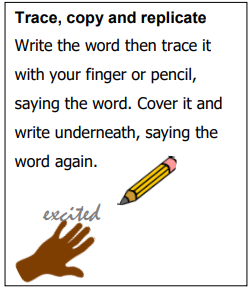Quick Beats
In today’s music lesson, we’ve explored Quick Beats – it’s an app used to create different styles of drum beats, like grime, hip-hop and Latin.
We mirrored our iPads onto the board so we could share our beats with our classmates – everyone was impressed at how cool our beats sounded!
Nicholas – ‘Scarlet’s beats were wild because it sounds like it’d be played in the jungle!’
Joe – ‘Evie’s beats made me feel like I was at a disco!’
Siana – ‘Jess’ beats were upbeat and energetic.’
The children have been given their log-ins so that they can have a go at accessing Quick Beats at home.
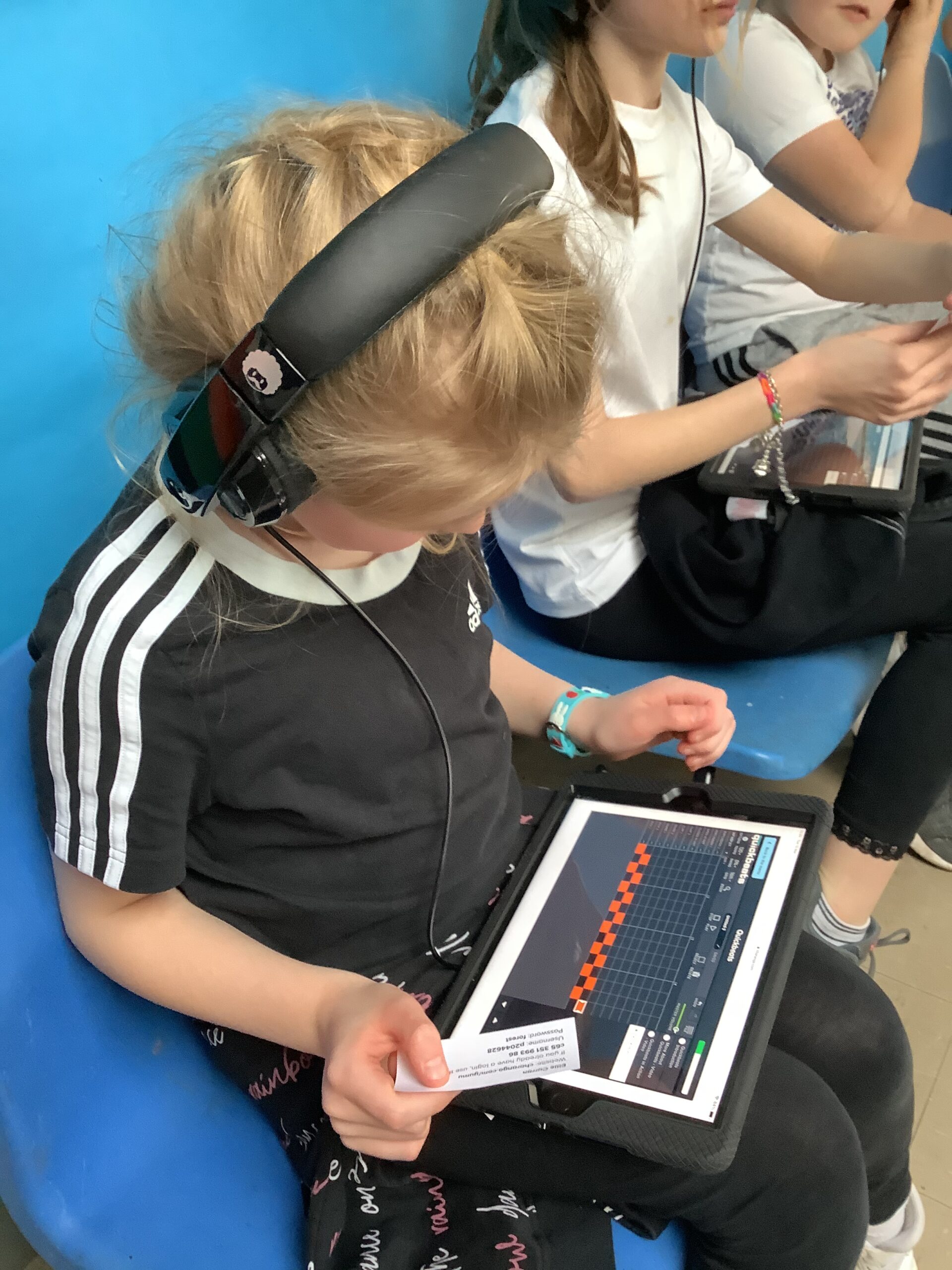
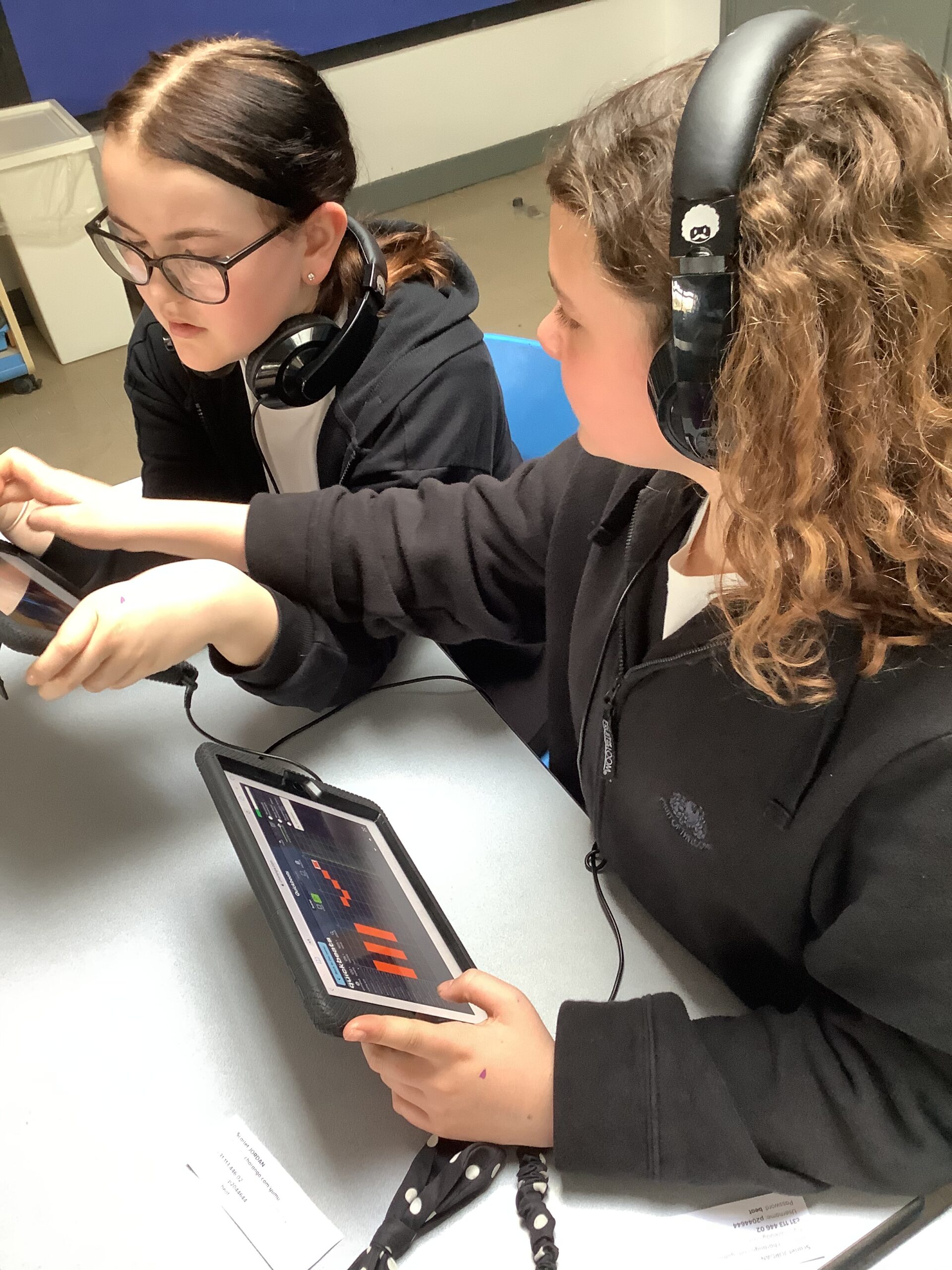
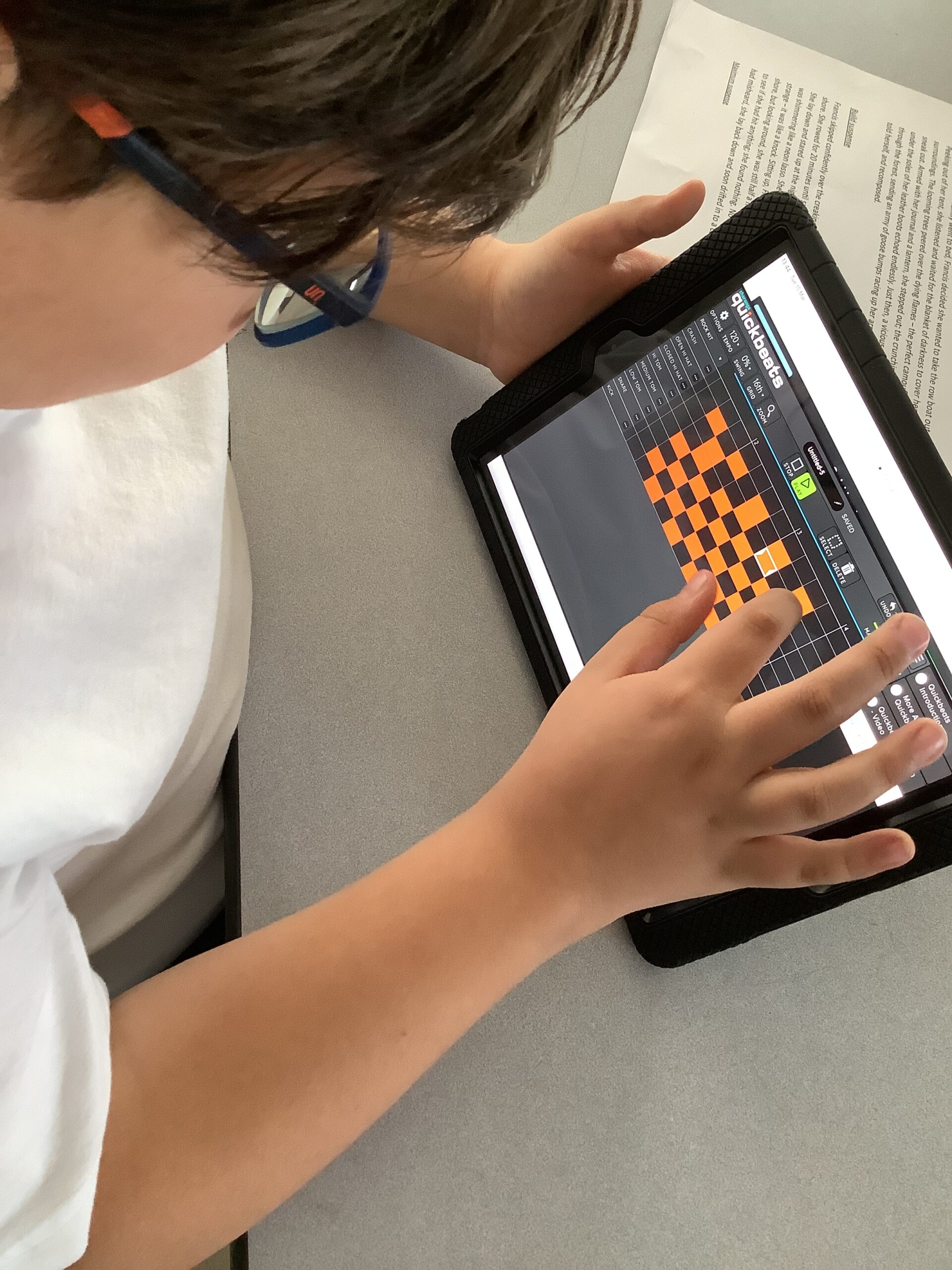
This week’s bible story
The Son Who Left Home: Luke 15:11-32
Jesus told many stories that are recorded in the New Testament. His stories were often about everyday events that all the people could relate to, but they had a special purpose – they were told to help people understand more about God. Usually, the stories, or parables as they are called, spoke for themselves, but sometimes they had to be explained. Let me now tell you one of Jesus’ best-known parables.
Read the story of the son who left home.
Reflection:
Jesus told this story to show how much God loves us. Just like the son in the story, we often want our own way and do not think of the consequences. We make foolish mistakes and come to regret them later. Just like the father in the story, though, God never stops loving us and is always ready to forgive us when we admit our wrongdoing.
Prayer:
Dear Lord,
Forgive us, we pray, for the times when we have acted foolishly.
When we have wanted our own way and not listened to good advice;
when we have not considered the thoughts or feelings of others.
May we be prepared to forgive others when they are sorry for hurting or upsetting us, just as you are prepared to forgive us when we admit our wrongdoing.
Amen.
Week beginning 14 March 2022
Sorry you can’t be in school this week. Here are a range of resources linked to what is happening in class. Don’t forget to get in touch with your class teacher if you need support.
Maths
Follow this sequence of maths learning which is linked to algebra.
Lesson 1: video, worksheet, answers
Lesson 2: video, worksheet, answers
Lesson 3: video, worksheet, answers
Lesson 4: video, worksheet, answers
Lesson 5: video, worksheet, answers
Lesson 6: video, worksheet, answers
Lesson 7: video, worksheet, answers
Lesson 8: video, worksheet, answers
Lesson 9: video, worksheet, answers
Lesson 10: video, worksheet, answers
You don’t have to print the worksheet. Your child can write or draw their answers on paper. Your child’s learning will be most effective if you sit with them to pause the clip and check / praise / support your child as the clip moves on.
Practise times tables on Times Table Rockstars, too. Email the class teacher if you need your child’s login and password details.
(Suggested time: 30 minutes of Maths and 15 minutes of Rockstars daily)
Spelling
Look on the homework page to find this week’s spellings. They should choose some past spellings that they feel less confident with. Your child should complete one task each day.
- Day 1: Generate more words linked to the spelling pattern or ‘rule’. You could look out for the words in the book you’re reading at home, or any other text, like a website linked to our science topic of Living Things and their Habitat.
- Day 2: Practise the spellings using two of the ideas in our Super Spelling Strategies guide. (Set yourself and others at home a challenge of using some of the words when you’re speaking, too!)
- Day 3: Write separate sentences, each containing one of the spellings. (Don’t forget to show off really neat handwriting and make sure you sentence starts with a capital letter and ends with a full stop, exclamation mark (!) or question mark (?).
- Day 4: Repeat Task 2 or 3.
- Day 5: Get an adult at home to test you on your spellings. Practise any you spell incorrectly – you could write them out carefully until you’re sure.
(Suggested time: 15-20 minutes daily)
Reading fluency.
This is the text we’re using in school. It’s some top tips to stay safe online.
In school, we generally follow this sequence:
- Day 1: Read the text aloud with your child listening. Read it clearly and slowly, pointing to each word as you read. Have a chat about any unfamiliar words.
- Day 2: Read aloud each sentence (a full short sentence or part of a longer sentence), and have your child read it back to you. Do this ‘echo reading’ for the whole text.
- Day 3: Read the text and talk about the effect of the punctuation on how you read it – pauses for full stops and expression for exclamations (!) or questions (?). Your child reads the text aloud.
- Day 4: Read together with expression (just like you practised on Day 3).
- Day 5: Your child reads independently and fluently.
(Suggested time: 15 minutes daily)
Reading comprehension
We’ll be using this RIC text in class to practise comprehension skills. RIC stands for:
- Retrieve: finding information in a text
- Interpret: using clues in the text to unlock information
- Choice: thinking about the author’s choice of words, techniques or organisation that make the text interesting and enjoyable to read
This half term we’ll be reading a range of fiction and non-fiction texts about computing and online safety. Here’s a series of lessons based on A Career in Computer Games by Anthony Horowitz. There’s a whole series of lessons, but start at Lesson 1 and work through, doing one (or maybe even two) each day. If you’re self-isolating in your second week, try these poetry lessons on The British by Benjamin Zephaniah (Suggested time: 30 minutes daily)
Writing
In writing, be learning how to write a set of instructions for a computer game. Follow these lessons on instructional writing. There’s a whole series of lessons, but start at Lesson 1 and work through, doing one (or maybe even two) each day. (If you’re self-isolating in your second week, stick with the series of lessons you’ve already started and aim to complete the full series.)
(Suggested time: 30-40 minutes for each)
Topic
Our topic this half-term is computing.
Follow these lessons on selection in quizzes from Oak Academy. Follow the lesson sequence. It has 6 lessons so you could do three a week.
(Suggested time: 30-40 minutes)
Science
Last half term our topic was evolution.
These six lessons from Oak National Academy link closely to what we’ve been doing in class last half term. Start at Lesson 1 and work through, doing two or three in the week. If you’ve previously completed one of these lessons, have a go at the ones you haven’t completed yet.
If Science really motivates your child, you could also use look at these lessons all about practical Science.
(Suggested time: 30-45 minutes)
PE
Don’t forget to do some daily exercise!
Do two or three of these Five Minute Moves from Joe Wicks each day – spread them across the day as if they were playtimes, maybe!
Try working through this series of 25 lessons from the Association for Physical Education – do two or three in the week.
(Suggested time: 5 minutes daily, plus 30 minutes for the longer PE lessons)
Extra stuff…
As an extra (or as an alternative, if this helps to motivate your child)…
Geography isn’t a topic-driver this half-term, but you could brush up on your locational knowledge – something that was missed when schools closed earlier this year. You could explore some online maps and try to memorise some new countries, capitals, rivers and mountain ranges. These three lessons about Europe are worth checking out.
What about some Living and Learning? While you’re away from school, you could check out these lessons on money!
Week beginning 14 March 2022
Sorry you can’t be in school this week. Here are a range of resources linked to what is happening in class. Don’t forget to get in touch with your class teacher if you need support.
Maths
Follow this sequence of maths learning which is linked to fractions.
Lesson 1: video, worksheet, answers
Lesson 2: video, worksheet, answers
Lesson 3: video, worksheet, answers
Lesson 4: video, worksheet, answers
Lesson 5: video, worksheet, answers
Lesson 6: video, worksheet, answers
Lesson 7: video, worksheet, answers
Lesson 8: video, worksheet, answers
Lesson 9: video, worksheet, answers
Lesson 10: video, worksheet, answers
You don’t have to print the worksheet. Your child can write or draw their answers on paper. Your child’s learning will be most effective if you sit with them to pause the clip and check / praise / support your child as the clip moves on.
Practise times tables on Times Table Rockstars, too. Email the class teacher if you need your child’s login and password details.
(Suggested time: 30 minutes of Maths and 15 minutes of Rockstars daily)
Spelling
Look on the homework page to find this week’s spellings. They should choose some past spellings that they feel less confident with. Your child should complete one task each day.
- Day 1: Generate more words linked to the spelling pattern or ‘rule’. You could look out for the words in the book you’re reading at home, or any other text, like a website linked to our science topic of Living Things and their Habitat.
- Day 2: Practise the spellings using two of the ideas in our Super Spelling Strategies guide. (Set yourself and others at home a challenge of using some of the words when you’re speaking, too!)
- Day 3: Write separate sentences, each containing one of the spellings. (Don’t forget to show off really neat handwriting and make sure you sentence starts with a capital letter and ends with a full stop, exclamation mark (!) or question mark (?).
- Day 4: Repeat Task 2 or 3.
- Day 5: Get an adult at home to test you on your spellings. Practise any you spell incorrectly – you could write them out carefully until you’re sure.
(Suggested time: 15-20 minutes daily)
Reading fluency.
This is the text we’re using in school. It’s some top tips to stay safe online.
In school, we generally follow this sequence:
- Day 1: Read the text aloud with your child listening. Read it clearly and slowly, pointing to each word as you read. Have a chat about any unfamiliar words.
- Day 2: Read aloud each sentence (a full short sentence or part of a longer sentence), and have your child read it back to you. Do this ‘echo reading’ for the whole text.
- Day 3: Read the text and talk about the effect of the punctuation on how you read it – pauses for full stops and expression for exclamations (!) or questions (?). Your child reads the text aloud.
- Day 4: Read together with expression (just like you practised on Day 3).
- Day 5: Your child reads independently and fluently.
(Suggested time: 15 minutes daily)
Reading comprehension
We’ll be using this RIC text in class to practise comprehension skills. RIC stands for:
- Retrieve: finding information in a text
- Interpret: using clues in the text to unlock information
- Choice: thinking about the author’s choice of words, techniques or organisation that make the text interesting and enjoyable to read
This half term we’ll be reading a range of fiction and non-fiction texts about computing and online safety. Here’s a series of lessons based on A Career in Computer Games by Anthony Horowitz. There’s a whole series of lessons, but start at Lesson 1 and work through, doing one (or maybe even two) each day. If you’re self-isolating in your second week, try these poetry lessons on The British by Benjamin Zephaniah (Suggested time: 30 minutes daily)
Writing
In writing, be learning how to write a set of instructions for a computer game. Follow these lessons on instructional writing. There’s a whole series of lessons, but start at Lesson 1 and work through, doing one (or maybe even two) each day. (If you’re self-isolating in your second week, stick with the series of lessons you’ve already started and aim to complete the full series.)
(Suggested time: 30-40 minutes for each)
Topic
Our topic this half-term is computing.
Follow these lessons on selection in quizzes from Oak Academy. Follow the lesson sequence. It has 6 lessons so you could do three a week.
(Suggested time: 30-40 minutes)
Science
Last half term our topic was evolution.
These six lessons from Oak National Academy link closely to what we’ve been doing in class last half term. Start at Lesson 1 and work through, doing two or three in the week. If you’ve previously completed one of these lessons, have a go at the ones you haven’t completed yet.
If Science really motivates your child, you could also use look at these lessons all about practical Science.
(Suggested time: 30-45 minutes)
PE
Don’t forget to do some daily exercise!
Do two or three of these Five Minute Moves from Joe Wicks each day – spread them across the day as if they were playtimes, maybe!
Try working through this series of 25 lessons from the Association for Physical Education – do two or three in the week.
(Suggested time: 5 minutes daily, plus 30 minutes for the longer PE lessons)
Extra stuff…
As an extra (or as an alternative, if this helps to motivate your child)…
Geography isn’t a topic-driver this half-term, but you could brush up on your locational knowledge – something that was missed when schools closed earlier this year. You could explore some online maps and try to memorise some new countries, capitals, rivers and mountain ranges. These three lessons about Europe are worth checking out.
What about some Living and Learning? While you’re away from school, you could check out these lessons on money!
Week beginning 14 March 2022
Hi everyone
We hope you’re feeling happy and healthy at home. We miss having you in school but we want you to know that you’re still very much part of our school community. Enjoy your home learning for this week.
Maths
Follow this sequence of maths learning which is linked to fractions.
- Lesson 1: video, worksheet, answers
- Lesson 2: video, worksheet, answers
- Lesson 3: video, worksheet, answers
- Lesson 4: video, worksheet, answers
- Lesson 5: video, worksheet, answers
- Lesson 6: video, worksheet, answers
- Lesson 7: video, worksheet, answers
- Lesson 8: video, worksheet, answers
- Lesson 9: video, worksheet, answers
- Lesson 10: video, worksheet, answers
You don’t have to print the worksheet. Your child can write or draw their answers on paper. Your child’s learning will be most effective if you sit with them to pause the clip and check / praise / support your child as the clip moves on.
Practise times tables on Times Table Rockstars, too. If your child is in Y3, we’re concentrating on the 8 times table. If your child is in Y4, we’re concentrating on all times tables up to and including 12 x 12. Email the class teacher if you need your child’s login and password details.
(Suggested time: 30 minutes of Maths and 15 minutes of Rockstars daily)
Spelling
Look on the homework page to find this week’s spellings. They should choose some past spellings that they feel less confident with. Your child should complete one task each day.
- Day 1: Generate more words linked to the spelling pattern or ‘rule’. You could look out for the words in the book you’re reading at home, or any other text, like a website linked to our science topic of Living Things and their Habitat.
- Day 2: Practise the spellings using two of the ideas in our Super Spelling Strategies guide. (Set yourself and others at home a challenge of using some of the words when you’re speaking, too!)
- Day 3: Write separate sentences, each containing one of the spellings. (Don’t forget to show off really neat handwriting and make sure you sentence starts with a capital letter and ends with a full stop, exclamation mark (!) or question mark (?).
- Day 4: Repeat Task 2 or 3.
- Day 5: Get an adult at home to test you on your spellings. Practise any you spell incorrectly – you could write them out carefully until you’re sure.
(Suggested time: 15-20 minutes daily)
Reading fluency
This is the text we’re using in class this week to build up fluency skills.
In school, we generally follow this sequence:
- Day 1: Read the text aloud with your child listening. Read it clearly and slowly, pointing to each word as you read. Have a chat about any unfamiliar words.
- Day 2: Read aloud each sentence (a full short sentence or part of a longer sentence), and have your child read it back to you. Do this ‘echo reading’ for the whole text.
- Day 3: Read the text and talk about the effect of the punctuation on how you read it – pauses for full stops and expression for exclamations (!) or questions (?). Your child reads the text aloud.
- Day 4: Read together with expression (just like you practised on Day 3).
- Day 5: Your child reads independently and fluently.
(Suggested time: 15 minutes daily)
Reading comprehension
We’ll be using this RIC text in class to practise comprehension skills. RIC stands for:
- Retrieve: finding information in a text
- Interpret: using clues in the text to unlock information
- Choice: thinking about the author’s choice of words, techniques or organisation that make the text interesting and enjoyable to read
Follow these lessons from Oak National Academy. There’s a whole series of lessons, but start at Lesson 1 and work through, doing one (or maybe even two) each day. (If you’re self-isolating in your second week, stick with the series of lessons you’ve already started and aim to complete the full series.)
(Suggested time: 30 minutes daily)
Writing
Follow these lessons from Oak National Academy. There’s a whole series of lessons, but start at Lesson 1 and work through, doing one (or maybe even two) each day. (If you’re self-isolating in your second week, stick with the series of lessons you’ve already started and aim to complete the full series.)
(Suggested time: 30-40 minutes for each)
Topic
Our topic this half-term is about computing.
Follow these lessons from Oak National Academy. There’s a whole series of lessons, but start at Lesson 1 and work through, doing one (or maybe even two) each day. (If you’re self-isolating in your second week, stick with the series of lessons you’ve already started and aim to complete the full series.)
(Suggested time: 30-40 minutes)
Science
Our focus this half-term is about working scientifically.
These six lessons from Oak National Academy link closely to what we’ve been doing in class. Start at Lesson 1 and work through, doing two or three in the week. If you’ve previously completed on of these lessons, have a go at the ones you haven’t completed yet.
If Science really motivates your child, you could also use look at these lessons all about practical Science.
(Suggested time: 30-45 minutes)
PE
Don’t forget to do some daily exercise!
Do two or three of these Five Minute Moves from Joe Wicks each day – spread them across the day as if they were playtimes, maybe!
Try working through this series of 25 lessons from the Association for Physical Education – do two or three in the week.
(Suggested time: 5 minutes daily, plus 30 minutes for the longer PE lessons)
Extra stuff…
As an extra (or as an alternative, if this helps to motivate your child)…
Fancy learning about a new religion? You don’t have to be religious to learn about, and appreciate, religions from all around the world. Check out this set of lessons from Oak National Academy – you could choose to focus on one religion or dip into each set for an overview.
What about some Living and Learning? While you’re away from school, you could check out these lessons on keeping safe!
Week beginning 14 March 2022
Hi everyone
We hope you’re feeling happy and healthy at home. We miss having you in school but we want you to know that you’re still very much part of our school community. Enjoy your home learning for this week.
Maths
Follow this sequence of maths learning which is linked to fractions.
- Lesson 1: video, worksheet, answers
- Lesson 2: video, worksheet, answers
- Lesson 3: video, worksheet, answers
- Lesson 4: video, worksheet, answers
- Lesson 5: video, worksheet, answers
- Lesson 6: video, worksheet, answers
- Lesson 7: video, worksheet, answers
- Lesson 8: video, worksheet, answers
- Lesson 9: video, worksheet, answers
- Lesson 10: video, worksheet, answers
You don’t have to print the worksheet. Your child can write or draw their answers on paper. Your child’s learning will be most effective if you sit with them to pause the clip and check / praise / support your child as the clip moves on.
Practise times tables on Times Table Rockstars, too. If your child is in Y3, we’re concentrating on the 8 times table. If your child is in Y4, we’re concentrating on all times tables up to and including 12 x 12. Email the class teacher if you need your child’s login and password details.
(Suggested time: 30 minutes of Maths and 15 minutes of Rockstars daily)
Spelling
Look on the homework page to find this week’s spellings. They should choose some past spellings that they feel less confident with. Your child should complete one task each day.
- Day 1: Generate more words linked to the spelling pattern or ‘rule’. You could look out for the words in the book you’re reading at home, or any other text, like a website linked to our science topic of Living Things and their Habitat.
- Day 2: Practise the spellings using two of the ideas in our Super Spelling Strategies guide. (Set yourself and others at home a challenge of using some of the words when you’re speaking, too!)
- Day 3: Write separate sentences, each containing one of the spellings. (Don’t forget to show off really neat handwriting and make sure you sentence starts with a capital letter and ends with a full stop, exclamation mark (!) or question mark (?).
- Day 4: Repeat Task 2 or 3.
- Day 5: Get an adult at home to test you on your spellings. Practise any you spell incorrectly – you could write them out carefully until you’re sure.
(Suggested time: 15-20 minutes daily)
Reading fluency
This is the text we’re using in class this week to build up fluency skills.
In school, we generally follow this sequence:
- Day 1: Read the text aloud with your child listening. Read it clearly and slowly, pointing to each word as you read. Have a chat about any unfamiliar words.
- Day 2: Read aloud each sentence (a full short sentence or part of a longer sentence), and have your child read it back to you. Do this ‘echo reading’ for the whole text.
- Day 3: Read the text and talk about the effect of the punctuation on how you read it – pauses for full stops and expression for exclamations (!) or questions (?). Your child reads the text aloud.
- Day 4: Read together with expression (just like you practised on Day 3).
- Day 5: Your child reads independently and fluently.
(Suggested time: 15 minutes daily)
Reading comprehension
We’ll be using this RIC text in class to practise comprehension skills. RIC stands for:
- Retrieve: finding information in a text
- Interpret: using clues in the text to unlock information
- Choice: thinking about the author’s choice of words, techniques or organisation that make the text interesting and enjoyable to read
Follow these lessons from Oak National Academy. There’s a whole series of lessons, but start at Lesson 1 and work through, doing one (or maybe even two) each day. (If you’re self-isolating in your second week, stick with the series of lessons you’ve already started and aim to complete the full series.)
(Suggested time: 30 minutes daily)
Writing
Follow these lessons from Oak National Academy. There’s a whole series of lessons, but start at Lesson 1 and work through, doing one (or maybe even two) each day. (If you’re self-isolating in your second week, stick with the series of lessons you’ve already started and aim to complete the full series.)
(Suggested time: 30-40 minutes for each)
Topic
Our topic this half-term is about computing.
Follow these lessons from Oak National Academy. There’s a whole series of lessons, but start at Lesson 1 and work through, doing one (or maybe even two) each day. (If you’re self-isolating in your second week, stick with the series of lessons you’ve already started and aim to complete the full series.)
(Suggested time: 30-40 minutes)
Science
Our focus this half-term is about working scientifically.
These six lessons from Oak National Academy link closely to what we’ve been doing in class. Start at Lesson 1 and work through, doing two or three in the week. If you’ve previously completed on of these lessons, have a go at the ones you haven’t completed yet.
If Science really motivates your child, you could also use look at these lessons all about practical Science.
(Suggested time: 30-45 minutes)
PE
Don’t forget to do some daily exercise!
Do two or three of these Five Minute Moves from Joe Wicks each day – spread them across the day as if they were playtimes, maybe!
Try working through this series of 25 lessons from the Association for Physical Education – do two or three in the week.
(Suggested time: 5 minutes daily, plus 30 minutes for the longer PE lessons)
Extra stuff…
As an extra (or as an alternative, if this helps to motivate your child)…
Fancy learning about a new religion? You don’t have to be religious to learn about, and appreciate, religions from all around the world. Check out this set of lessons from Oak National Academy – you could choose to focus on one religion or dip into each set for an overview.
What about some Living and Learning? While you’re away from school, you could check out these lessons on keeping safe!
We’ve been gardening!
This week in nursery, our focus books have been ‘Jasper’s Beanstalk’ and ‘Oliver’s Vegetables’. Reading these books (and talking about them) has encouraged us to think about how plants grow and what sorts of foods are good for our bodies. The children have enjoyed planting seeds and beans and have predicted what their plants will look like once they have fully grown. We’ve also looked closely at flowers and have made some wonderful observational drawings using a limited palette of colours. Next week, the children will be looking at how they have changed and grown since they were babies and we would really appreciate a photograph of your child as a baby for a display in our room. We’ll be measuring how tall we are and will be talking about all the wonderful things the children have learned to do since they were born.
Dates for your diary:
Our Parent Teacher Consultation Evening is on Monday, 21st March. Appointments can be made online – please let us know if you have any difficulties booking them.
Friday, 18th March is Red Nose Day. Your child can come to nursery wearing an item of red clothing to celebrate the day.
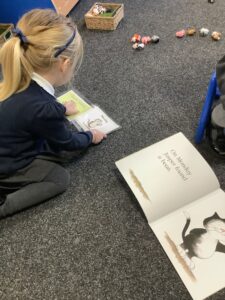
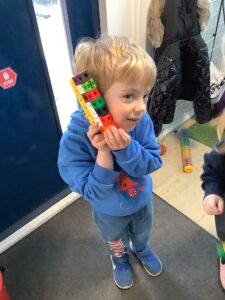
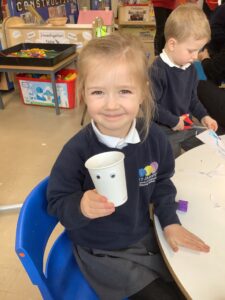
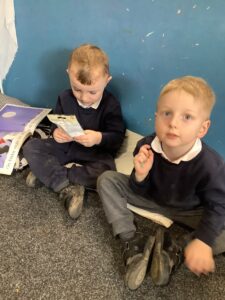
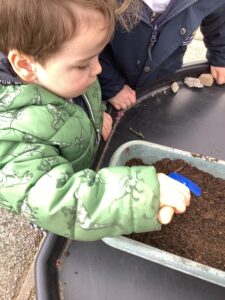
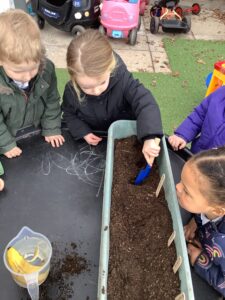
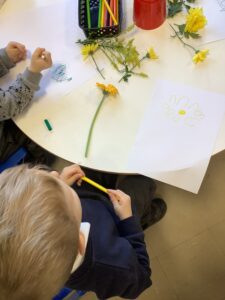
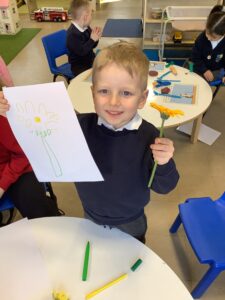
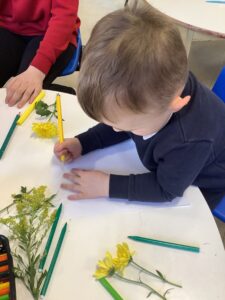
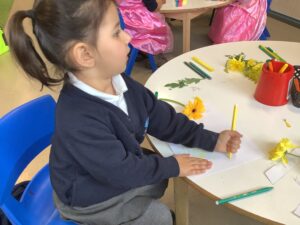
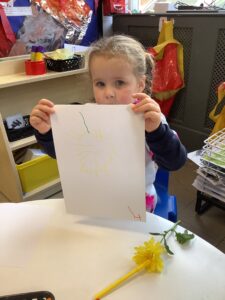
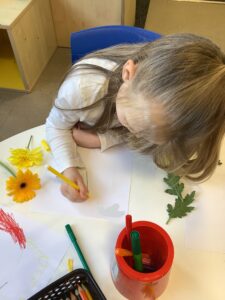
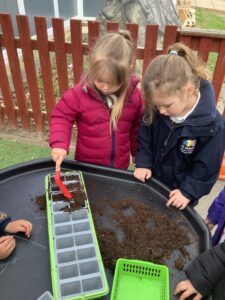
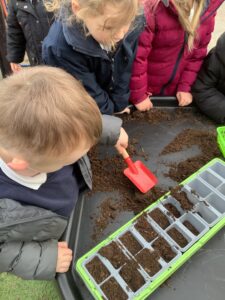
This week’s message (Friday 11 March 2022)
This week’s message comes from Mr Wilks, who leads on Science and Foundation subjects. Each half-term, Mr Wilks talks about the current whole-school topic – this time, it’s about Computing…
What do we mean by topics?
Topics are the vehicle for delivering much of the learning in the foundation subjects (eg history, art, geography, DT). Each half-termly topic has a ‘driving’ subject – the main focus for teaching pupils the knowledge and skills they need to succeed in life. The driver changes with each topic to ensure a broad and balanced curriculum.
Although the learning in each topic is provided by the driving subject, there are opportunities for enrichment through other subjects. For example, learning in an art topic may be enriched by geography learning about where an artist was born and lived.
Read more about the intent, implementation and impact of our topics.
What is this half-term’s topic?
This half-term, it’s Computing. Your child will develop their knowledge of computers and computer programming.
Computer programming is super. Creating games, animations and solving real world problems is fun, encourages creativity and is challenging! Importantly, the skills children will use and develop are transferable to other subjects and areas of life. For example, the concept of decomposition in programming is concerned with breaking down a large task into smaller chunks. This concept could be used when writing a story, solving a maths problem or tidying a particularly messy bedroom! Debugging is the skill of identifying and fixing an error in a program. It requires systematic, objective thinking and plenty of resilience.
Each phase has age-related specific knowledge, skills and vocabulary that they’ll learn, use and apply across the topic. See pages 15-18 of the curriculum statement document.
Years 1 and 2
Children are learning about how technology is used beyond school in our homes and all around us. They’re considering what a computer is and isn’t.
In programming lessons, they’re being introduced to algorithms and will learn about how they need to be written in the correct sequence.
They’re creating their own algorithms in ‘unplugged computing’ lessons and will debug errors in their own and others’ algorithms. Next, they’ll plan and create their own unplugged game where they have to create an algorithm to move a character from one place to another using positional language.
They’ll then use the same concepts using Beebots – simple robots which can be programmed to move and turn. Finally, it’ll be time to create their own game using Beebots.
Years 3 and 4
Children will reason about what exactly makes a computer a computer. Is a games console a computer? Is a TV a computer? Is a bedside lamp a computer? Next, they’ll learn about inputs and outputs and identify different examples of them in everyday technology.
It’s then time for programming. Like Key Stage 1, they begin with some ‘unplugged computing’. They’ll create and debug unplugged programs which use sequence and repetition before they then create their own unplugged game which will require some decomposition. Next, it’s time to program on a platform called Scratch Jr. It’s a free app available on most devices and will allow children to develop and refine their understanding and use of concepts like repetition and sequence. Finally, they’ll create their own game on Scratch Jr using all of the skills they’ve learned over the topic. They’ll to be creative to plan and design their own game, whether it’s a maze game or a simple platform game.
Years 5 and 6
As in Year 3 and 4, children begin the topic by reasoning about what makes a computer a computer. They’ll then learn about what a computer network is and that the Internet is an enormous computer network. In programming lessons, they’ll use Scratch to gain a deeper understanding of concepts like sequence and repetition before learning about selection and variables. Some of this vocabulary may sound alien to you. However, before the end of the topic, your child will be able to tell you what they mean and give examples of how they’ve used them in their projects. Some of the projects your child might make are:
- a Spirograph style drawing animation with some potentially psychedelic visual effects!
- a chatbot program which will ask you questions and decide if your responses are correct or not.
- a times table quiz program that will test you on randomly selected times table questions within a set time limit.
How can you help?
Talk to your child about what they’ve been learning in class. The class news page of the school website is a good place to go to find out more about what children are doing.
The school library and local libraries have lots of books about coding and computer games – your child will be able to borrow the books to develop both their reading skills and computing knowledge.
Finally, try programming with your child. There are loads of programming apps and software available to download, often for free…
Key Stage 1
- Daisy the Dinosaur (Apple only)
- Beebot
- Tynker Junior
Key Stage 2
- Lightbot
- Tynker
- Scratch Jr
- Scratch
Super learning!
It’s been another busy week in the Reception classroom.
The fantastic learning just keeps coming!
Literacy
This week, we continued to look at The Hundred Decker Bus by Mike Smith. The children were amazing at retelling and remembering the key events. For the writing chilli challenge, they had to design a new deck and write a sentence about their deck. I stuck all of the children’s decks onto a roll of paper and the children came in on Thursday and saw their very own 30 decker bus displayed in their classroom.
Click here to view our bus.
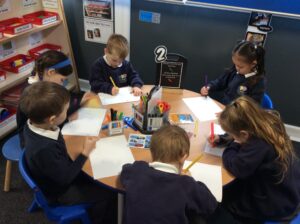
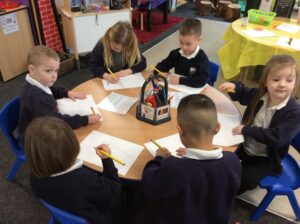
Living and Learning
This week, our living and learning session was all about recognising the importance of personal hygiene including handwashing.
I asked the children, “How do we keep ourselves clean?”
LW – You get a shower and use soap.
BI – You have a bath.
EK – We need to brush our teeth.
OR – We brush our teeth in the morning and at night.
FH – We wash our clothes.
We based yesterday’s session on handwashing. Before doing our experiments, we started by thinking about why and when we wash our hands.
First, we had a go at the germ experiment, We used soap, pepper (germs) and water to see how important it is to wash our hands. The children were amazed when they watched the germs (pepper) move away from the soap on their fingers.
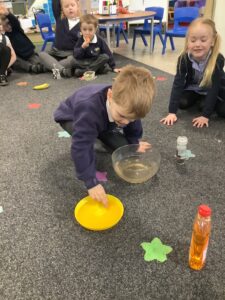
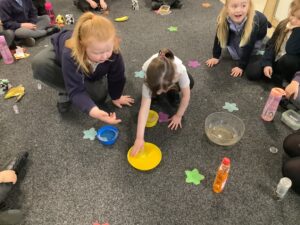
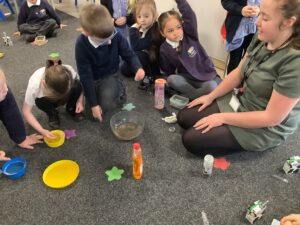
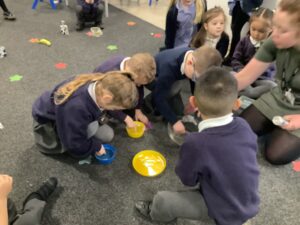
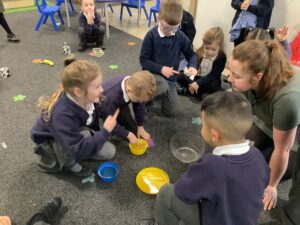 Then, we had a go at the mouldy bread experiment.
Then, we had a go at the mouldy bread experiment.
The first child was asked to rub their hands on a piece of bread. The second child was asked to wash their hands for 20 seconds and rub their hands on another slice of bread. Next week, the children will check and observe the bread daily to see if their predictions were right.
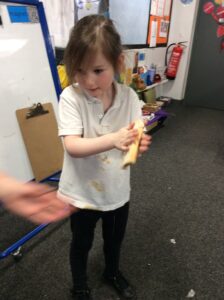
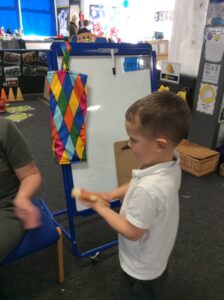 Click here to watch us sing our new washing hands song!
Click here to watch us sing our new washing hands song!
Here are some more highlights from this week…
Reading phase 3 words and scanning the QR code to see if they got it right.
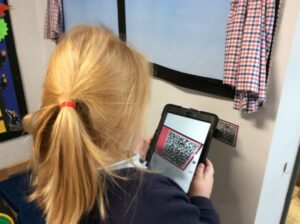
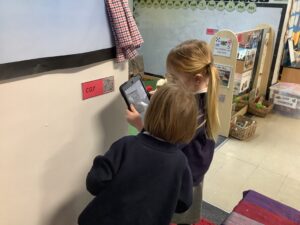
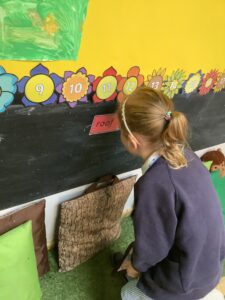
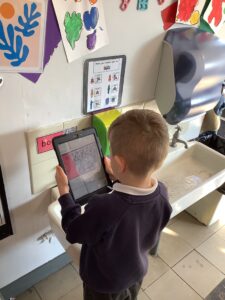
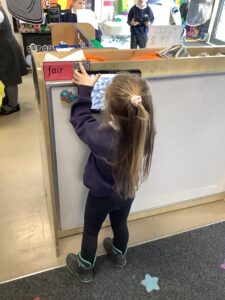
Using the tissue paper to make a picture of the tulips.
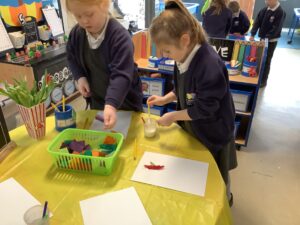
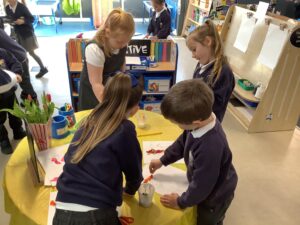
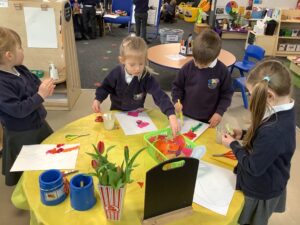
Planting vegetable seeds.
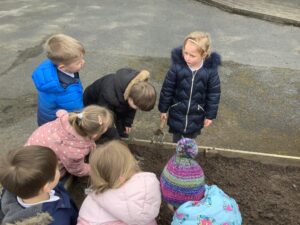
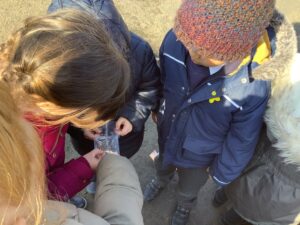
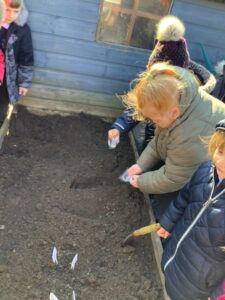 Reminders!
Reminders!
Please make sure you write in your child’s reading record when you’ve read at home. It is important we see how your child is doing with their reading at home.
Please make sure you return the farm visit slip by Monday 21 March.
11 March 2022
Y1: was, we, were, where, you, your
This week, Year 2 have been looking at plurals by adding s and es to words and -es to nouns and verbs ending in -y. The y is changed to i before -es is added.
Y2: thanks, spends, catches, rocks, flies, tries, replies, copies, babies, carries.
